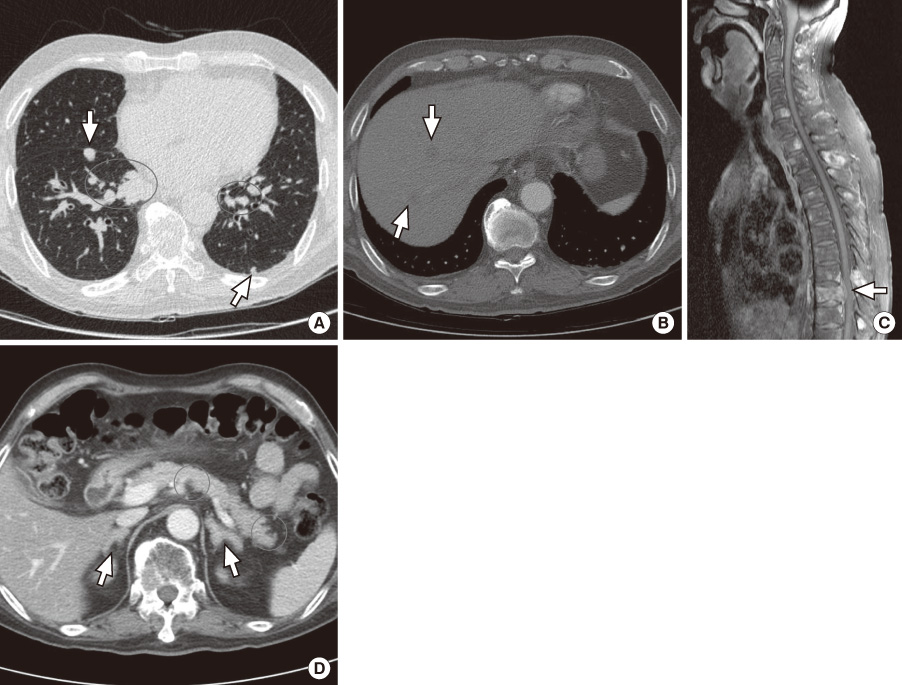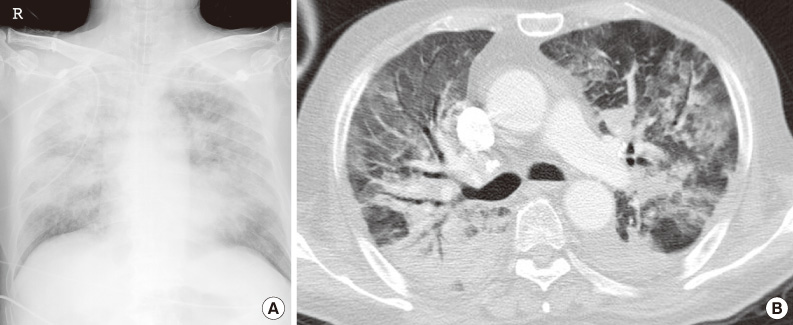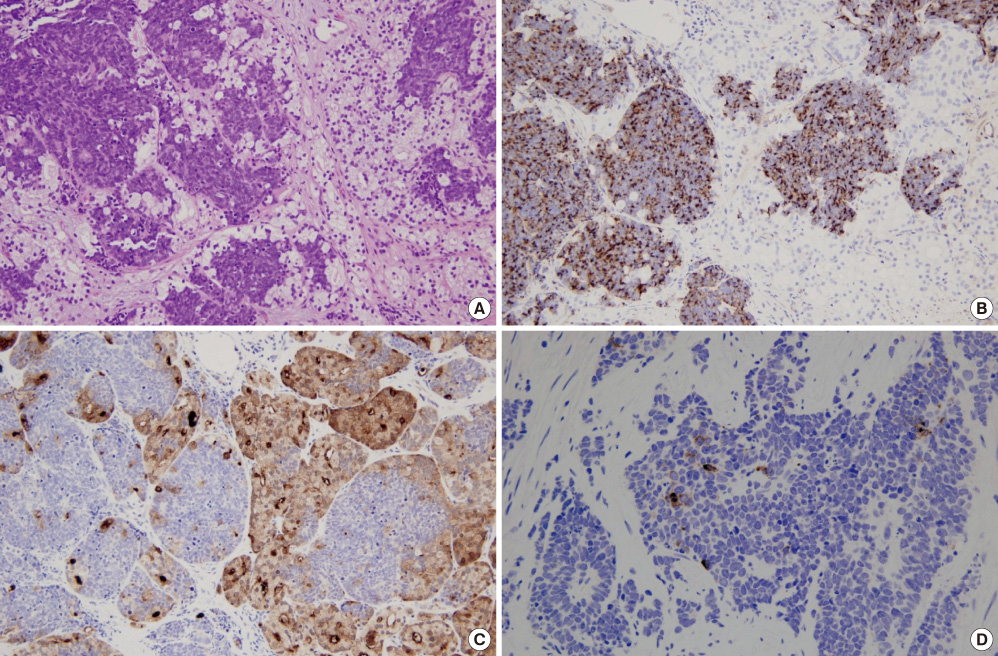Endocrinol Metab.
2012 Sep;27(3):237-243. 10.3803/EnM.2012.27.3.237.
A Case of Ectopic ACTH Syndrome Associated with Metastatic Prostate Cancer
- Affiliations
-
- 1Department of Internal Medicine, Seoul National University College of Medicine, Seoul, Korea. yjparkmd@snu.ac.kr
- 2Department of Pathology, Seoul National University Bundang Hospital, Seongnam, Korea.
- 3Department of Pathology, Seoul National University College of Medicine, Seoul, Korea.
- 4Department of Urology, Seoul National University Bundang Hospital, Seongnam, Korea.
- KMID: 2282409
- DOI: http://doi.org/10.3803/EnM.2012.27.3.237
Abstract
- Ectopic adrenocorticotropic hormone (ACTH) syndrome is mostly associated with neuroendocrine tumors and small cell carcinoma of the lung. This syndrome of prostate cancer is rare and has been reported in only a few cases. We report a patient with ectopic ACTH production associated with metastatic prostate cancer. A 70-year-old patient with metastatic prostate cancer was admitted to our hospital with septic shock. He had a history of hormonal therapy and transurethral prostatectomy. Adrenocortical function was checked due to consistent fever and poor general condition, which revealed markedly increased levels of basal plasma ACTH and serum cortisol. The patient did not present typical signs of the Cushing's syndrome, however, hypokalemia and a history of hypertension were found. He died in days as a result of multi-organ failure. On pathology, the prostatectomy specimen showed a tumor composed of mixed populations of adenocarcinoma and small cell carcinoma. The tumor cells in the small cell component were positive for chromogranin and ACTH. Although neuroendocrine differentiation in prostate cancer is rare, etopic ACTH production should be considered in patients with prostate cancer as well as in clinical features of ACTH hypersecretion.
MeSH Terms
-
ACTH Syndrome, Ectopic
Adenocarcinoma
Adrenocorticotropic Hormone
Aged
Carcinoma, Small Cell
Cellular Structures
Cushing Syndrome
Fever
Humans
Hydrocortisone
Hypertension
Hypokalemia
Lung
Neuroendocrine Tumors
Plasma
Prostate
Prostatectomy
Prostatic Neoplasms
Shock, Septic
Transurethral Resection of Prostate
Adrenocorticotropic Hormone
Hydrocortisone
Figure
Reference
-
1. Newell-Price J, Bertagna X, Grossman AB, Nieman LK. Cushing's syndrome. Lancet. 2006. 367:1605–1617.2. Isidori AM, Kaltsas GA, Pozza C, Frajese V, Newell-Price J, Reznek RH, Jenkins PJ, Monson JP, Grossman AB, Besser GM. The ectopic adrenocorticotropin syndrome: clinical features, diagnosis, management, and long-term follow-up. J Clin Endocrinol Metab. 2006. 91:371–377.3. Alexandraki KI, Grossman AB. The ectopic ACTH syndrome. Rev Endocr Metab Disord. 2010. 11:117–126.4. Rickman T, Garmany R, Doherty T, Benson D, Okusa MD. Hypokalemia, metabolic alkalosis, and hypertension: Cushing's syndrome in a patient with metastatic prostate adenocarcinoma. Am J Kidney Dis. 2001. 37:838–846.5. Haukaas SA, Halvorsen OJ, Nygaard SJ, Paus E. Cushing's syndrome in prostate cancer. An aggressive course of prostatic malignancy. Urol Int. 1999. 63:126–129.6. Kataoka K, Akasaka Y, Nakajima K, Nagao K, Hara H, Miura K, Ishii N. Cushing syndrome associated with prostatic tumor adrenocorticotropic hormone (ACTH) expression after maximal androgen blockade therapy. Int J Urol. 2007. 14:436–439.7. Alwani RA, Neggers SJ, van der Klift M, Baggen MG, van Leenders GJ, van Aken MO, van der Lely AJ, de Herder WW, Feelders RA. Cushing's syndrome due to ectopic ACTH production by (neuroendocrine) prostate carcinoma. Pituitary. 2009. 12:280–283.8. Lovern WJ, Fariss BL, Wettlaufer JN, Hane S. Ectopic ACTH production in disseminated prostatic adenocarcinoma. Urology. 1975. 5:817–820.9. Newmark SR, Dluhy RG, Bennett AH. Ectopic adrenocorticotropin syndrome with prostatic carcinoma. Urology. 1973. 2:666–668.10. Fjellestad-Paulsen A, Abrahamsson PA, Bjartell A, Grino M, Grimelius L, Hedeland H, Falkmer S. Carcinoma of the prostate with Cushing's syndrome. A case report with histochemical and chemical demonstration of immunoreactive corticotropin-releasing hormone in plasma and tumoral tissue. Acta Endocrinol (Copenh). 1988. 119:506–516.11. Gattinoni L, Carlesso E, Cressoni M. Assessing gas exchange in acute lung injury/acute respiratory distress syndrome: diagnostic techniques and prognostic relevance. Curr Opin Crit Care. 2011. 17:18–23.12. di Sant'Agnese PA. Neuroendocrine differentiation in carcinoma of the prostate. Diagnostic, prognostic, and therapeutic implications. Cancer. 1992. 70:1 Suppl. 254–268.13. Ministry of Health and Welfare. The Korea Central Cancer Registry. Annual report of cancer statistics in Korea in 2008. 2010. Seoul: Ministry of Health and Welfare;29–35.14. Jemal A, Center MM, DeSantis C, Ward EM. Global patterns of cancer incidence and mortality rates and trends. Cancer Epidemiol Biomarkers Prev. 2010. 19:1893–1907.15. Salgado LR, Fragoso MC, Knoepfelmacher M, Machado MC, Domenice S, Pereira MA, de Mendonça BB. Ectopic ACTH syndrome: our experience with 25 cases. Eur J Endocrinol. 2006. 155:725–733.16. Gennari FJ. Hypokalemia. N Engl J Med. 1998. 339:451–458.17. Sarlis NJ, Chanock SJ, Nieman LK. Cortisolemic indices predict severe infections in Cushing syndrome due to ectopic production of adrenocorticotropin. J Clin Endocrinol Metab. 2000. 85:42–47.18. Debes JD, Tindall DJ. Mechanisms of androgen-refractory prostate cancer. N Engl J Med. 2004. 351:1488–1490.19. Taplin ME, George DJ, Halabi S, Sanford B, Febbo PG, Hennessy KT, Mihos CG, Vogelzang NJ, Small EJ, Kantoff PW. Prognostic significance of plasma chromogranin a levels in patients with hormone-refractory prostate cancer treated in Cancer and Leukemia Group B 9,480 study. Urology. 2005. 66:386–391.20. Mosca A, Berruti A, Russo L, Torta M, Dogliotti L. The neuroendocrine phenotype in prostate cancer: basic and clinical aspects. J Endocrinol Invest. 2005. 28:11 Suppl International. 141–145.
- Full Text Links
- Actions
-
Cited
- CITED
-
- Close
- Share
- Similar articles
-
- A Case of Cushing's Syndrome Associated with Ectopic ACTH Production in Patient with Small: cell Lung Cancer
- A Case of Pheochromocytoma associated with Ectopic ACTH Syndrome
- A Case of Ectopic ACTH Syndrome Caused by Wilms Tumor
- A Case of Thymic Carcinoid Tumor Associated with Ectopic ACTH Syndrome
- A Case of Atypical Bronchial Carcinoid with Ectopic ACTH Syndrome




